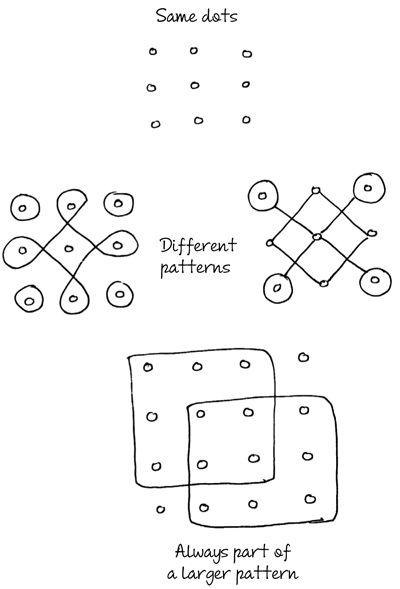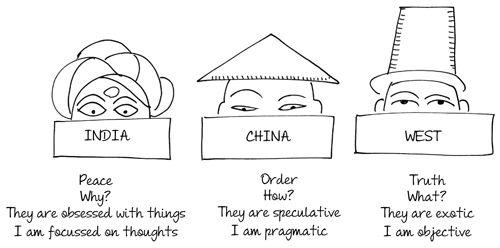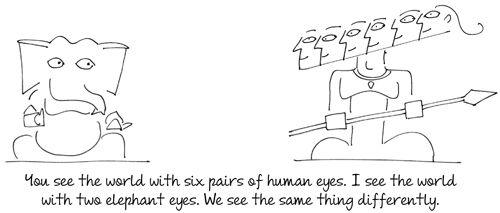Business Sutra: A Very Indian Approach to Management (5 page)
Read Business Sutra: A Very Indian Approach to Management Online
Authors: Devdutt Pattanaik

If it does not, it is still perfectly fine.

As the sages remind us: thoughts exist on shifting sands and flowing waters. Ideas presented can always change, or be further elaborated, or explained differently, by different people in different times and different places faced with different challenges. For now, every time you disagree, and wish to argue, and are driven by the belief that there must be one truth and only one truth, find peace by reminding yourself:
Within infinite myths lies an eternal truth
Who sees it all?
Varuna has but a thousand eyes
Indra, a hundred
You and I, only two.


II
From Goal to Gaze
Decoding Western, Chinese and Indian Beliefs
 lephant-headed Ganesha and his brother, the six-headed Kartikeya, decide to race three times around the world. Kartikeya being athletic jumps on his peacock and flies around the mountains, oceans and continents. Ganesha simply goes around his parents. In some versions, Ganesha simply twirls around and declares himself winner. When asked for an explanation for this audacious declaration, Ganesha tells Kartikeya, "You went around your world: the objective world of things. I went around my world: a subjective world of thoughts. What matters more?" With a typical Indian headshake, head bobbing from side to side, Kartikeya smiles and replies, "Depends!"
lephant-headed Ganesha and his brother, the six-headed Kartikeya, decide to race three times around the world. Kartikeya being athletic jumps on his peacock and flies around the mountains, oceans and continents. Ganesha simply goes around his parents. In some versions, Ganesha simply twirls around and declares himself winner. When asked for an explanation for this audacious declaration, Ganesha tells Kartikeya, "You went around your world: the objective world of things. I went around my world: a subjective world of thoughts. What matters more?" With a typical Indian headshake, head bobbing from side to side, Kartikeya smiles and replies, "Depends!"
Everything depends on our beliefs: the lens of subjective truth that helps us make sense of the world.
- The Western lens clubs India and China as the exotic, where the symbolic is preferred over the literal. It seeks the truth and believes there is only one life with one goal. It is most concerned with the what of business.
- The Chinese lens clubs India and the West as Indo-European, for being overly speculative rather than pragmatic. It seeks order and believes in keeping out chaos. It is most concerned with the how of business.
- The Indian lens clubs China and the West as materialistic for valuing things rather than thoughts. It seeks peace as the mind is very aware of different goals of different people in different contexts or different lifetimes. It is most concerned with the why of business.
In this chapter, we shall gaze upon these beliefs and learn to appreciate the diversity of human thought. Only when the horizon is broadened can we begin our journey into the gaze-based approach to management.
The ideas presented here are neither politically correct nor academically certified, as sweeping generalizations need to be made to ascertain a pattern, which is buried under layers of forms. This book will also not answer questions as to what actually defines the 'West', 'India' and 'China': are these historical, geographical, political, religious or cultural terms? Any attempt to answer these questions will burn the ship at the port before any exploration can begin.
The approach may not please those who seek validation of their religious, scientific or secular beliefs. For the rest, this book will open a new world of seeing. It will reveal that people today, stripped of modern technology and language, continue to see the world exactly as their ancestors did a thousand years ago. We are still seeking the heaven of heroes, the paradise of the faithful, the nectar of immortality and the order of celestials.

Western Beliefs
Two mythic streams feed the river of what we call Western thought today: the Greek and the biblical. The latter is also sometimes referred to as Abrahamic or Semitic. Greek beliefs thrived in the Greek city-states and the Roman Empire. Abrahamic belief, expressed formally in Judaism, Christianity and Islam, has many tributaries from across many ancient civilizations of the Levant (the Near East), Mesopotamia, Persia, Arabia and even Egypt.
What separates the two belief systems is the value they place on the individual over the collective, on defiance over compliance. What unites these two belief systems is belief in one life, and hence the sense of urgency to do the great thing, or the right thing, in this—our one and only—life. Hence, the goal!

The goal for the Greeks was Elysium, meant for individuals who lived extraordinary lives. It was the final destination of mythic heroes such as Achilles, Odysseus, Theseus, Jason and Perseus. Those who lived ordinary unremarkable lives were sent to the Asphodel Fields after death. Those who angered the gods were thrown into Tartarus, condemned to do monotonous tasks, like Sisyphus who was condemned to roll a rock up a mountain all day, only to find it rolling back down at night. This was hell: doing monotonous mundane chores endlessly. The gods lived on Mount Olympus, controlling everything. These Olympians achieved their exalted position after overthrowing older gods, the Titans, and so constantly feared overthrow at the hands of humans, who they kept in check through the Fates. To be extraordinary, and win a place in Elysium, humans had to defy the gods.
Greek beliefs inspired Alexander of Macedonia in the fourth century BCE to conquer the world. They also inspired the very efficient and rather ruthless Roman Empire that saw itself as the harbinger of civilization and held sway over much of the Mediterranean for centuries. Both the Greeks and Romans were wary of all authority, be it at home (dictators) or outside (the Persian Emperor and the Egyptian Pharaoh). Authority was equated with the capricious Olympian gods, who had to be resisted.
When the Roman Empire collapsed around the fifth century, Christianity became the dominant force across Europe. Christians believed in one all-powerful God, who created humanity, and rules, for the betterment of humanity. The goal now was compliance, not defiance, which led to a place in the Promised Land on earth and Heaven in the afterlife. Unfortunately, humans kept breaking these rules. The Bible is full of stories of prophets and kings struggling to follow the Commandments laid down by God. There is constant reference to the martyrdom of the faithful who stand up for the faith.
- This was the belief of Jewish tribes who roamed the deserts around the Levant and Mesopotamia since 2000 BCE. Their holy books, the Tanakh, are full of laws and negotiations of the prophets with God seeking to ensure humans lived the right way. This came to be known as Judaism.
- This became the belief of Roman slaves, later Roman nobility, and finally the Roman royalty, but with one crucial difference: they believed Jesus to be Christ, the anointed one, the Son of God, who sacrificed himself out of love to save prodigal humanity. This was Christianity.
- This belief also rose in Arabia in the seventh century where Jesus came to be seen as just one of many prophets, the last being Muhammad who transmitted the word of God through the book known as the Koran. This was Islam.
It is important at this juncture to clarify that from the Indian point of view Western thought stretches beyond Europe and America to include the Islamic world, for the quest for objectivity shapes Islam too. Just as Europe was torn between the Greek way and the biblical way and later the Protestant way and the Catholic way, the Islamic world was torn between the Sunni way, with its roots in Arabic tribal egalitarianism and the Shia way, with its roots in Persian dynastic culture. Every denomination is convinced the other is wrong and that they are right. Everyone harbours a worldview that accommodates only one truth.
Divinity in the Abrahamic faiths is always articulated as the Word of God and divine laws are always presented in written form (such as the Ten Commandments) that need to be read, indicating the objectivity of these laws.
The covenant is valued greatly. The bond with God is not assumed; it has to be ritually enacted through circumcision or baptism. This reveals the deep-rooted need for documentation and written memorandums of understanding.
